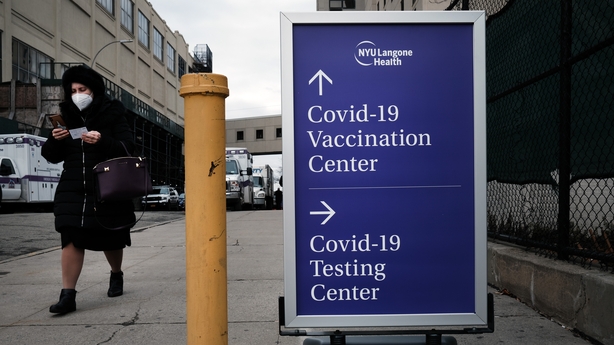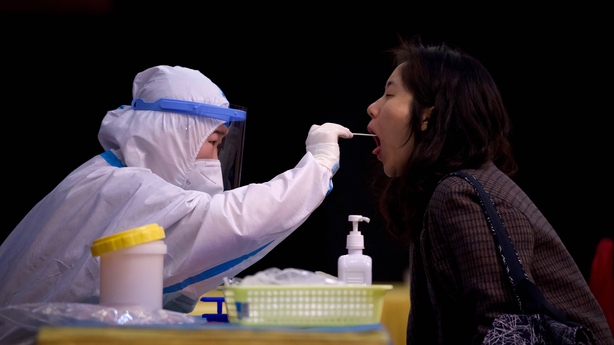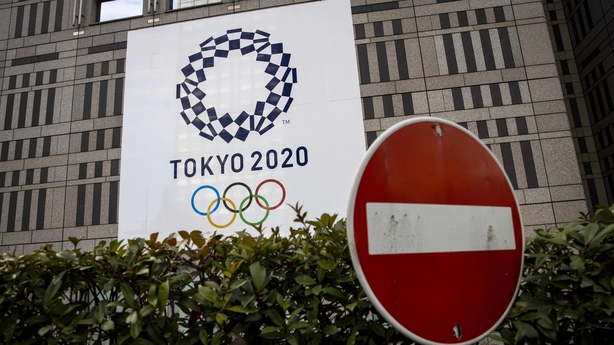European Union chief Charles Michel has defended Europe's much-criticised Covid-19 inoculation strategy by stressing Brussels will share jabs with the world and "will not use vaccines for propaganda purposes".
"We should not let ourselves be misled by China and Russia, both regimes with less desirable values than ours, as they organise highly limited but widely publicised operations to supply vaccines to others," the European Council president said.
The blunt comments came as the EU's 27 member states struggle to achieve lift-off with a plan to immunise 70% of adults by mid-September.
The start of it, over the first three months of this year, has been marked by severe criticism of Brussels for spearheading a collective purchase of vaccine doses that have largely failed to be delivered.
The strategy was backed by the member states and implemented by the European Commission.
Much of the initial delivery shortfall was down to Anglo-Swedish company AstraZeneca failing to meet its supply schedule to the European Union.
Some member states, among them Hungary, the Czech Republic and Slovakia, are increasingly looking to vaccines not authorised by the EU's medicine regulator, the EMA, to fill the gap, in particular Russia's Sputnik V jab and ones from China.
The EMA is reviewing how effective and safe Sputnik V is, and an Italian-Swiss pharmaceutical company, Adienne, has agreed to produce it in Italy.
But the EU executive has indicated it is unwilling to add it to its vaccines portfolio, which is projected to deliver 2.6 billion doses over this year and next.
EU officials believe Russia and China are trying to score political points and expand influence by rushing to deliver their vaccines before they were rigorously vetted by regulators.
Mr Michel said the EU, in contrast, was "actively promoting its values" by investing early in Covid-19 vaccine development and being the prime driver of the Covax facility to deliver doses to poorer countries.
"Without Europe, it would not have been possible to develop and produce several types of vaccines in less than one year," he said.
Mr Michel also said that, while the EU has a mechanism to monitor, and if necessary, block the export of doses out of the bloc, he was "shocked when I hear the accusations of 'vaccine nationalism' against the EU".
"The EU has never stopped exporting," he said, whereas "the United Kingdom and the United States have imposed an outright ban on the export of vaccines or vaccine components produced on their territory".
Paris ICUs near full capacity as severe Covid cases surge
Intensive care units at hospitals in the Paris region are nearly full with Covid-19 patients, health authorities warned, with doctors putting off non-urgent operations in order to free up more beds.
The surge in cases comes ahead of a government crisis meeting tomorrow, with officials hoping to avoid a new lockdown for the French capital.
A nationwide curfew of 6pm is in place, and weekend shutdowns have been ordered for the northern Pas-de-Calais region, where transfers of Covid-19 patients to less crowded hospitals began last week, and in the Mediterranean region surrounding Nice.
In Paris and its suburbs, 1,018 intensive care unit beds are filled of the 1,050 set aside for coronavirus patients, the ARS regional health authority said.
It is the first time the number has exceeded 1,000 since 18 November, when France was still under the second nationwide lockdown since the crisis erupted last February.
Officials will now postpone 40% of non-urgent operations in order to have a total of 1,577 beds available for Covid-19 cases soon, the agency said.
Sputnik V to be produced in Italy
An Italian-Swiss pharmaceutical company has agreed to produce Russia's Sputnik V vaccine in Italy, the first such deal in the European Union, a trade body said.
"The vaccine will be produced from July 2021 in (pharma company) Adienne factories in Lombardy," northern Italy, said Stefano Maggi, a spokesman for the Italian-Russian Chamber of Commerce.
"Ten million doses will be produced between July 1 and January 1, 2022," he added, describing it as the "first agreement on the European level for the production on EU territory of the Sputnik vaccine".
Several European Union countries have already begun distributing Sputnik V, but it has yet to be approved by the bloc's medicines regulator.
Last week, the Amsterdam-based European Medicines Agency launched a rolling review of the Sputnik V vaccine, a key step towards being approved as the first non-Western jab to be used against the coronavirus across the 27-nation bloc.
"If the vaccine is not authorised in Europe by July 1, the doses produced (in Italy) will be bought by the Russian sovereign fund and distributed in countries where the Sputnik vaccine is authorised," Mr Maggi said.
Italy's health ministry declined to comment on the deal, while Adienne was not immediately available.
The EU has so far authorised three vaccines: the US-German Pfizer/BioNTech jab, US firm Moderna's shot, and the British-Swedish AstraZeneca/Oxford vaccine.
It is set to decide on the one-shot Johnson & Johnson vaccine on Thursday, while jabs by Novavax and CureVac are also under rolling review.
US daily virus death toll drops below 1,000
For the first time in nearly three-and-a-half months, the United States recorded fewer than 1,000 deaths in a day from Covid-19 yesterday, according to Johns Hopkins University.
In 24 hours, 749 people died from the coronavirus, far below the peak of 4,473 deaths recorded on 12 January.
The daily US death toll has not been below the thousand mark since 29 November, when 822 people died in a 24-hour period.
That indicates that the slowdown in the epidemic is continuing in the US, where infection rates and deaths have fallen to similar levels as before Halloween, Thanksgiving, Christmas, and other end-of-year holidays that were marked by travel and larger gatherings that boosted the spread of the virus.

The slowdown is good news for President Joe Biden, whose colossal $1.9 trillion aid plan successfully passed the Senate on Saturday, and will bolster his large-scale vaccination strategy.
The US vaccine campaign launched in December is now in full swing, with nearly 10% of the American population - about 31.5 million people - having received either the two shots necessary for the Pfizer or Moderna vaccines, or the single shot in the case of the Johnson & Johnson vaccine.
Health authorities added to the cautious optimism when they announced that vaccinated people could meet together in small groups indoors without wearing masks or the need for social distancing.
However, they must continue to respect these precautionary measures in the presence of unvaccinated people and in public spaces.
China launches virus passport
China has announced a health certificate programme for domestic travellers, leading the world in plans for so-called virus passports.
The digital certificate, which shows a user's vaccination status and virus test results, is available for Chinese citizens via a programme on Chinese social media platform WeChat that was launched yesterday.
The certificate is being rolled out "to help promote world economic recovery and facilitate cross-border travel", a foreign ministry spokesman said.
However, the international health certificate is currently only available for use by Chinese citizens and it is not yet mandatory.

The certificate, which is also available in paper form, is thought to be the world's first known "virus passport".
The US and Britain are among countries currently considering implementing similar permits.
The EU is also working on a vaccine "green pass" that would allow citizens to travel between member countries and abroad.
China's programme includes an encrypted QR code that allows each country to obtain a traveller's health information, state media agency Xinhua reported.
"QR health codes" within WeChat and other Chinese smartphone apps are already required to gain entry to domestic transport and many public spaces in China.
The apps track a user's location and produce a "green" code - synonymous with good health - if a user has not been in close contact with a confirmed case or has not travelled to a virus hotspot.
But the system has sparked privacy concerns and fears it marks an expansion of government surveillance.
No overseas spectators at Tokyo Games - reports
The Olympic Games in Tokyo will be staged without fans from overseas due to the Covid-19 pandemic, Kyoto News has reported, citing sources.
The starting ceremony for this month's Olympic torch relay will also likely be held without spectators, a Japanese newspaper reported, but fans will still be able to line the route.
The Yomiuri Shimbun daily reported that organisers feared crowding at the 25 March event in Fukushima, and would probably bar the 3,000 spectators initially planned.
A spokesman for Tokyo 2020 organisers would say only that "details of the (relay) Grand Start are still under discussion".
The organisers have already laid out strict rules for the virus-delayed, nationwide relay, which was called off in 2020 after the historic decision to postpone the Games by a year.

Cheering along the relay route will be strictly banned and people are asked to only attend sections near their homes and avoid crowding.
Mask-wearing will be mandatory, and spectators are asked to offer "support with applause and by using distributed goods rather than shouting or cheering".
Portions of the relay could also be suspended if there is overcrowding.
Organisers are battling persistent doubts about whether the Games can be held safely this summer and have unveiled a rulebook with various virus countermeasures.

